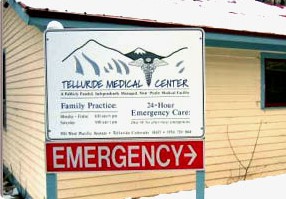
22 Feb MEDICAL MOMENT: ENERGY DRINKS. HOW BAD?
Telluride Inside… and Out is proud to feature the Telluride Medical Center’s MEDICAL MOMENT, a weekly column that answers common medical questions in pop culture. Have a question for the doctors? Click here to send.
Dr. Diana Koelliker answers this week’s question:
Just how bad are energy drinks?
In recent years, a number of energy drinks have entered the market to provide a quick boost of energy. These drinks usually contain high levels of caffeine and other additives, such as taurine, ginseng and carnitine that act as stimulants.
The average eight ounce cup of coffee contains about 100 mg of caffeine. Some energy drinks contain as much as 500 mg of caffeine per serving in addition to the other stimulants found in these beverages.
Because energy drinks are sold as nutritional supplements, they are not regulated as foods. Therefore, the FDA does not regulate or limit the amount or content of ingredients in these drinks; you may not know exactly what you are drinking when you consume these products.
So, does that necessarily mean these drinks are bad for you? In small doses, caffeine is a pretty innocuous substance. However, in high concentrations, it can cause sleep disturbances, anxiety, restlessness, elevation in blood pressure and heart rate, abnormal heart rhythms (arrhythmia), seizures and even death.
As an Emergency physician, we certainly have seen an increase in visits related to energy drinks. In 2005 there were about 1,100 ER visits in the US related to these drinks; in 2008 there were more than 16,000 visits. The numbers continue to rise.
What’s worse, the trend of combining energy drinks with alcohol is popular with college students and young adults. This may be due to a misperception that caffeine counteracts alcohol; it does not.
A high caffeine content stimulant effect can prevent a person from becoming sleepy, but it does not prevent impairment, nor does it quicken reaction time or motor skills. Caffeine and alcohol together can lead to increased participation in risky behavior, like driving. It also can lead to what I call the “superman effect,” where the person believes they can skateboard down a flight of stairs. The consequences can be dangerous and even deadly.
Energy drinks are especially dangerous for children and adolescents. The American Academy of Pediatrics recommends energy drinks should never be consumed by children or adolescents.
High levels of caffeine have been associated with harmful neurologic and cardiovascular effects in children, and drinks containing stimulants should never be given for hydration or as a supplement to young persons. Parents should warn teenagers and young adults of the dangers of mixing these drinks with alcohol.
In summary, if you have a history of high blood pressure, heart problems, seizures or if you are pregnant, it’s best to steer clear from energy drinks. Any person, regardless of their health status, can be at risk of side effects of these beverages if too much is consumed or if they are consumed in association with alcohol. Finally, there is no place for energy drinks in the diet of a child or adolescent.
If you have questions about these drinks or other supplements, ask your primary care provider.
Editor’s note: The Telluride Medical Center is the only 24-hour emergency facility within 65 miles. You can choose your own medical provider visit with a specialist or take advantage of their Mountain Skin Care services. As a mountain town in a challenging, remote environment, a thriving medical center is vital to our community’s health. For more Medical Moments on TIO, Click Here.




Sorry, the comment form is closed at this time.